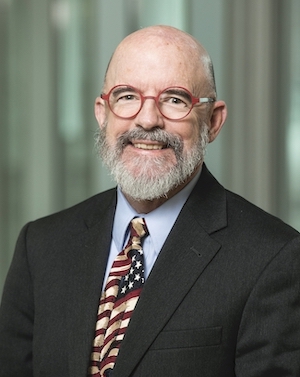
Jeremy Mayer
President Trump’s recent impeachment differs vastly from previous ones, such as that of Bill Clinton, in part due to the nature of the alleged crimes and party dynamics, Mason experts said.
“Clinton was saved by his popularity; he was seen as a flawed human, but quite a good president, by the majority of Americans,” said Schar School of Policy and Government professor Jeremy Mayer. “The difference with Trump is not only that his alleged crimes were not personal in nature, but at the heart of the president’s foreign policy function and the integrity of the election system.”
Trump was acquitted by a Republican-controlled Senate on Feb. 5. Democrats fell short of the two-thirds majority required to remove the president from office, as senators voted 52 to 28 to acquit Trump on an abuse of power allegation, and voted 53 to 47 on an obstruction of Congress allegation.
The polarization of the country has also contributed to the difference in the impeachments, Mayer said.
“Today, the key is maintaining support from your party,” Mayer said. “Trump did that quite well.”
“Any Republican who broke with [Trump] in either chamber was likely to face dramatic confrontations in his or her Republication base, and certainly a primary challenge at the earliest opportunity,” Mayer said.
That’s why, for example, U.S. Rep. Justin Amash (MI-3rd district) announced he was leaving the Republican Party to become an independent, Mayer said.
“Amash said Trump merited impeachment, and he could no longer stay in the party, even though he was one of the most conservative members of Congress,” Mayer said. “It is Trump’s party, even more than the Democrats were Clinton’s party in 1999.”
The trials’ results speak to the impeachment process as whole, Mayer said.

Jim Pfiffner
“If you think it likely that Trump was guilty, this is a disaster in that the Senate basically refused to look at the evidence or hold a real trial with witnesses,” Mayer said. “If you think the impeachment was a partisan witch hunt, you don’t think the process is broken.”
What will this mean for the 2020 election?
“It might galvanize [Trump’s] base and encourage them to turn out to vote in November,” said Schar School professor Jim Pfiffner. “Or the exposure of what Trump had done to affect the 2020 campaign in an illegitimate way might convince people that he abused his power and vote against him.”
What happens between now and the election will be more telling, Pfiffner and Mayer agreed.
“Right now, it looks like a mild boost to President Trump, because he looks strong and successful and the Democrats are demoralized,” Mayer said. “However, there is a long way to go to the election still, and it is unlikely this will be determining.”
Jeremy Mayer can be reached at 703-993-8215 or jmayer4@gmu.edu.
James Pfiffner can be reached at pfiffner@gmu.edu.
For more information, contact Mariam Aburdeineh at 703-993-9518 or maburdei@gmu.edu.
About George Mason
George Mason University is Virginia’s largest public research university. Located near Washington, D.C., Mason enrolls 38,000 students from 130 countries and all 50 states. Mason has grown rapidly over the past half-century and is recognized for its innovation and entrepreneurship, remarkable diversity and commitment to accessibility.
